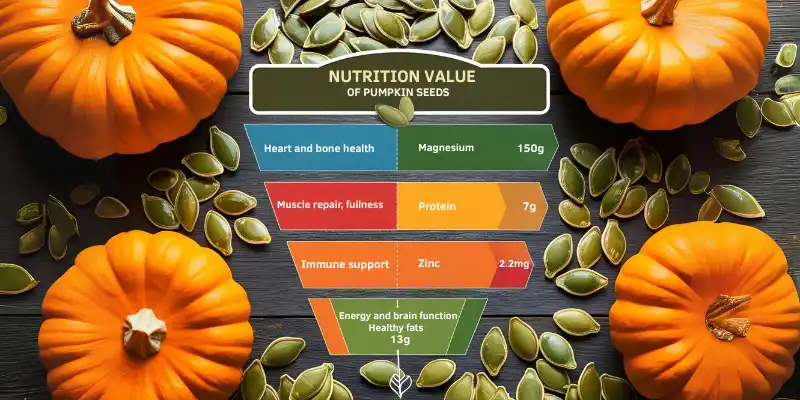Are Pumpkin Seeds Fiber? A Digestive Superfood Explained
Published: 18 May 2025
Hi, superfood lovers!
Does your gut ever feel like it’s missing a key ingredient? It just might be fiber—and pumpkin seeds could help fill that gap. Known for their crunch and nutrition, pumpkin seeds are a natural source of dietary fiber, especially when eaten with their shells. So when you ask, Are pumpkin seeds fiber? the answer is a gut-happy yes!
I’m Sheila, a botanist with seven years of hands-on experience studying plant-based nutrition. In this article, I’ll guide you through fiber types, health advantages, eating tips, and fun facts centred around pumpkin seeds.
By the end, you’ll understand how this tiny seed can significantly affect digestive wellness. Let’s unlock its benefits together crack the shell, boost your gut, and make every bite count!
Are Pumpkin Seeds Fiber?
Think of your digestive system as a machine; it works best when you give it the right fuel. A critical part of that fuel is fiber. And yes, pumpkin seeds have fiber, especially if you eat them whole with their shells on.
Pumpkin seeds are fiber-rich, especially when eaten whole with their shells. One ounce of entire seeds offers up to 5 grams of mostly insoluble fiber, which supports regular digestion and gut health.
In my experience, adding roasted whole seeds to meals boosts satisfaction and improves digestion naturally. For the most fiber, choose unshelled seeds. They’re a small change with enormous digestive benefits.
Whole vs Shelled Pumpkin Seeds: Fiber Comparison
Not all pumpkin seeds offer the same amount of fiber. It depends on whether you eat them with or without their shells. Think of the shell as the natural armour that carries extra digestive support.
Let’s examine the differences between whole seeds and shelled ones so you can make the most fiber-friendly choice.
| Type | Fiber Content (per 1 oz) | Fiber Type | Other Nutritional Highlights | Personal tip |
| Whole Pumpkin Seeds (with shells) | ~5g | Insoluble fiber | Helps with bowel regularity, keeps you full longer | I love snacking on them at work—they keep my digestion regular and energy up. |
| Shelled Pumpkin Seeds (pepitas) | ~1.1-~1.8g | Lower in fiber | Rich in protein, healthy fats, magnesium, and zinc | Great for smoothies, salads, or baking when you want nutrients without crunch. |
Types of Fiber in Pumpkin Seeds
Fiber works like a team. Each type plays a different role in keeping your digestive system balanced and efficient. Pumpkin seeds mainly offer insoluble fiber, with just a small amount of soluble fiber, but both bring value to your gut health.
Let’s explore how each type supports your body.
Insoluble Fiber
- Insoluble fiber is like a broom for your intestines. It sweeps waste through your digestive tract and helps keep everything moving.
- Pumpkin seeds, especially with their shells, are rich in this type of fiber.
- It bulks up your stool, prevents constipation, and supports regular bowel movements.
Personally, when I started snacking on roasted whole pumpkin seeds during long writing sessions, I noticed fewer bloating issues and more consistent digestion: no more sluggish gut days!
Soluble Fiber
- Pumpkin seeds contain a small amount of soluble fiber, which plays a quieter but more important role.
- This fiber absorbs water and forms a gel-like texture in the gut, helping to slow digestion.
- It can also support blood sugar control and gut bacteria balance.
- While pumpkin seeds aren’t a significant source, every bit contributes, especially when combined with other fiber-rich foods throughout the day.
Health Benefits of Fiber from Pumpkin Seeds
Think of fiber as the behind-the-scenes hero in pumpkin seeds. It doesn’t just pass through your system; it helps your body function more smoothly from the inside out.

The fiber in pumpkin seeds supports digestion, helps manage weight, and even keeps blood sugar levels steady.
Supports Digestive Health
- Pumpkin seed fiber, especially insoluble, encourages regular bowel movements by adding bulk and structure to waste. It also supports a healthy gut microbiome, creating a friendly environment for beneficial bacteria.
- In my routine, adding whole pumpkin seeds has helped reduce occasional bloating and supported a smoother digestive rhythm—like giving my gut a gentle tune-up.
Aids in Weight Management
- Fiber slows how quickly food leaves your stomach, which helps you feel full for longer. This reduces unnecessary snacking and cravings, making it easier to manage weight naturally.
- A small handful of pumpkin seeds as a midday snack can make a big difference in how much you eat later.
Stabilize Blood Sugar
- The soluble fiber in pumpkin seeds plays a slight yet significant role in blood sugar control. It slows sugar absorption, reducing blood sugar rises and drops.
- This can be a helpful boost if you’re trying to maintain steady energy or manage your glucose levels. Try enjoying pumpkin seeds alongside other whole foods like oats or fruits for even better results.
How to Eat Pumpkin Seeds for Maximum Fiber
Getting the most fiber from pumpkin seeds isn’t just about what you eat—it’s about how you eat it. Think of pumpkin seeds like tiny nutrient-packed packages, and how you prepare or pair them can make a big difference. Here are two easy ways to make them work harder for your digestive health.
Eat Them Whole
- Keep the shells on for the highest fiber content. The outer shell contains insoluble fiber, which enhances faeces and aids digestion.
- I often roast whole seeds with a sprinkle of sea salt. They’re crunchy, satisfying, and gut-friendly all in one bite.
Add Them to Meals
- Pumpkin seeds are incredibly versatile. Toss them on salads for added crunch, stir them into oatmeal or smoothies, or mix them into homemade granola or energy bars. These simple additions boost your fiber intake while adding texture and nutrients to your meals.
- I love blending them into morning smoothies in my kitchen for an easy fiber upgrade without any prep difficulty.
Things to Keep in Mind
Pumpkin seeds are nutritious, but a few small tips can help you enjoy them in a fresh and more digestive-friendly way.
Watch Your Portions
- A handful (about 1 oz) gives you fiber without too many calories.
- Excessive eating causes bloating and excess calories.
- Tip: I portion mine into mini jars to avoid overeating during snack time!
Pick Plain and Dry-Roasted
- Choose unsalted, dry-roasted seeds for the cleanest option.
- Avoid flavoured or oily pumpkin seed varieties. They often contain extra salt, sugar, or fat.
- I once bought a sweet-coated pack by mistake—lesson learned!
Be Gentle with Your Stomach
- The shells are great for fiber but may feel harsh for sensitive stomachs.
- If you’re new to them, start with a few or go for pepitas (shell-free seeds).
- Listen to your body, good fiber should feel good!
Final Verdict
To answer the big question: Are pumpkin seeds fiber? Yes, and especially when consumed whole with their shells. One ounce of entire pumpkin seeds provides around 5 grams of mostly insoluble fiber, which plays a key role in digestive regularity, satiety, and even blood sugar control.
I confidently recommend pumpkin seeds as a gentle, nutrient-packed fiber source that fits most diets—even for busy moms and beginners.
👉 Add them to your salad oats, or eat plain—simple, science-backed fiber in every bite.
Frequently Asked Questions
Are you still curious about the fiber in pumpkin seeds or how to enjoy them? These answers are tailored for everyday readers who want clarity without confusion.
Yes, you can enjoy pumpkin seeds daily in moderation. Just one ounce of whole seeds can give you around 5 grams of fiber, which is especially helpful for digestion. Balance is key—too much can add calories or cause bloating.
Yes, but they contain less fiber than whole seeds with shells. Pepitas offer around 1.8g of fiber per ounce, plus protein, iron, and magnesium. They’re great if your stomach is sensitive to shells.
Yes, but choose pepitas for younger kids to avoid choking risks. They’re easier to chew and still offer nutrients and a small amount of fiber. Always supervise children when introducing seeds.
Absolutely! roasting doesn’t remove the fiber content. Just make sure they’re dry-roasted and not loaded with salt or oil. That way, you get all the gut benefits without the extra sodium.
Chia seeds contain all fiber, but pumpkin seeds offer a great source of insoluble fiber, extra protein, and healthy fats. Both have benefits, so feel free to mix them into your diet.
| Reference |
|---|
Studies from the USDA and other reliable sources. |

- Be Respectful
- Stay Relevant
- Stay Positive
- True Feedback
- Encourage Discussion
- Avoid Spamming
- No Fake News
- Don't Copy-Paste
- No Personal Attacks

- Be Respectful
- Stay Relevant
- Stay Positive
- True Feedback
- Encourage Discussion
- Avoid Spamming
- No Fake News
- Don't Copy-Paste
- No Personal Attacks





